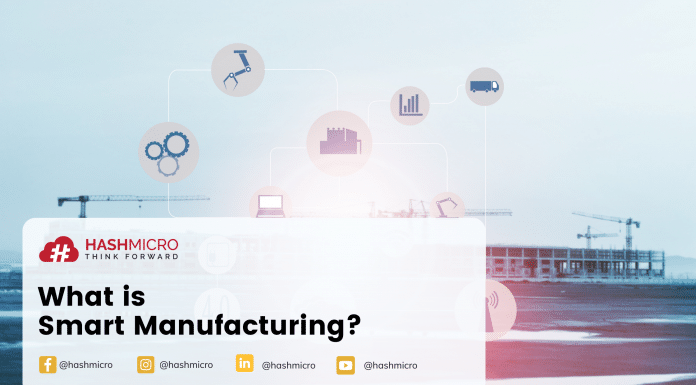In today’s digital era, a new concept has emerged called the smart factory and is part of the next industrial revolution. Companies that are slow to adopt new technologies and processes can fall behind. With the help of manufacturing software, companies can implement a smart factory by implementing digital technology accompanied by innovative practices and procedures expected to improve production quality.

Table of Content
- Understanding smart factory
- Realizing smart manufacturing with ERP assistance
- ERP integration with new technologies to empower smart factory
- Conclusion
-
Understanding smart factory
It is a broad concept and not something that a company can implement directly in the production process and smart manufacturing is a combination of various technologies and solutions applied to optimize the manufacturing process. Thus it also increases the overall profit. Smart manufacturing focuses on utilizing data. The data will tell the user what to do and the time to do it.
Realizing smart manufacturing with ERP assistance
In an industry that is undergoing a revolution, there will be many obstacle along the way. It is essential not to ignore the day-to-day challenges that manufacturers face daily. ERP has a vital role in solving your daily problems. The following are some of the functions of ERP:
Better data for better operations
Today’s ERP systems are easy to use, especially in simplifying user experience (UX) and information flow management. Apart from reducing costs through various system efficiencies however manufacturers want an ERP solution that saves their time and effort at the factory. Thanks to the artificial intelligence (AI) and intelligent sensor systems brought by the Industrial Internet of Things (IIoT), manufacturers’ business metrics can be combined with operational data to enhance business strategy and decision-making capabilities.
-
Speed up business automation
ERP offers a flexible and realistic way to simplify all business-related processes. Apart from automating workflow systems, ERP automation allows the workforce to focus on automated monitoring and monitoring methods therefore increases productivity and operational accuracy. Business automation reduces human dependency and fast processing.

Source: metrologynews.com Improve customer experience
Helping business organizations achieve customer satisfaction. ERP solutions allow businesses to schedule automated product delivery systems also check inventory processes additionally the system also provides practical insights into service capabilities and engages customer-focused ideas.
Allows greater visibility and efficiency of decision making
Supporting an intelligent manufacturing industry with smart decision-making analytics also ERP offers valuable insights into starting critical business-level processes. Besides, with high-tech visibility options, ERP allows workforce and managers to monitor and manage operations from remote locations.
With advanced ERP features, smart factories optimize almost all of their daily performance routines also ensure smooth and conflict-free communication between departments and obtain a high return on investment also by Integrating various innovative technologies, ERP has made a positive mark and caught the attention of business owners. Creative industries are now adopting and deploying the ERP concept rapidly.
ERP integration with new technologies to empower smart factory
ERP change the way on how to organize and design a business’s functional layout and allocated workforce to perform tasks. Technologies such as IoT, AI, cognitive computing, ML, and others, the impact of automation has substantially driven industrial processes in intelligent manufacturing and by digitizing nearly the entire manufacturing industry’s operations, ERP implementation marks the beginning of a more innovative and more sophisticated manufacturing industry.
ERP integrate new technology to start the smart factory process. Some examples are:
IIoT – Industrial Internet of Things (IIoT)
An environment where every device, machine and process is connected through a system that can generate data relevant to its needs which also allows you to access more data quickly.
The companies should have all systems connected via the cloud benefit from the scalability, increased efficiency, time savings, and reduced costs, with An inadequate ERP system it can prevent you from collecting centralized data and achieving employee productivity.
Big Data and Analytics
IIoT data is transferred to the cloud/software system via a data communication system. This massive amount of data offers a wealth of insights that can also help identify every aspect of the production process and after the data is analyzed, it is sent as feedback to the production system for action.
Security
Smart manufacturing is all about leveraging data that tells you what and when to do. Also, smart factories are built focusing on data and cyber security and an integral part in the intelligent manufacturing ecosystem.
Artificial Intelligence (AI)
Growth in the use of big data technology will drive AI growth, industrial IoT in manufacturing, the widespread use of robotics in manufacturing, computer vision technology (AR and VR) in manufacturing, partnerships and collaborations across industries, as well as a significant increase in capital investment venture.
-
Conclusion
HashMicro Manufacturing System provides scalable as well as affordable support for manufacturers to make smart factory with the use of cloud solutions equipped with Business Intelligence features to help the companies gain comprehensive insights about business performance, thereby increasing business productivity and profitability. Get your chance to increase your business with a free demo system from Hashmicro.

-
Related articles:













